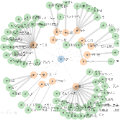Knowledge graph reasoning (KGR) -- answering complex logical queries over large knowledge graphs -- represents an important artificial intelligence task, entailing a range of applications (e.g., cyber threat hunting). However, despite its surging popularity, the potential security risks of KGR are largely unexplored, which is concerning, given the increasing use of such capability in security-critical domains. This work represents a solid initial step towards bridging the striking gap. We systematize the security threats to KGR according to the adversary's objectives, knowledge, and attack vectors. Further, we present ROAR, a new class of attacks that instantiate a variety of such threats. Through empirical evaluation in representative use cases (e.g., medical decision support, cyber threat hunting, and commonsense reasoning), we demonstrate that ROAR is highly effective to mislead KGR to suggest pre-defined answers for target queries, yet with negligible impact on non-target ones. Finally, we explore potential countermeasures against ROAR, including filtering of potentially poisoning knowledge and training with adversarially augmented queries, which leads to several promising research directions.
翻译:暂无翻译





